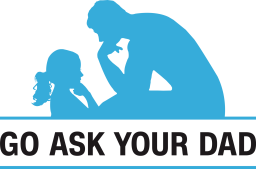Editor’s Note: Go Ask Your Dad is parenting advice with a philosophical bent as one dad explores what we want out of life, for ourselves and our children, through useful paradigms and best practices. Share your insight at the CNN Parenting Facebook page.
One of the greatest tests of a parent’s patience comes at night when you are trying to get your child to fall asleep, stay asleep or go back to sleep.
You know you need to rock them, stroke their back or just keep a reassuring hand on them until they settle down and nod off. But that time is playing a zero-sum game with your own need for sleep and everything else you need or want to do: work, have time with your spouse, zone out on Netflix or just enjoy the quiet after the kids have gone to sleep.

When my older daughter was just a baby, I figured out a way to combat my impatience in these moments: I’d count to 100. Not quickly, but 100 slow back-and-forth sways while holding her on my chest or 100 calm and steady rubs of her back. One hundred was more than I often needed, but since I didn’t know how many I needed, it gave me the light at the end of the tunnel that almost always did the trick. My impatience would subside just knowing that I’d reach the goal.
What soon happened with 100 strokes was even better. By not perseverating over the activities waiting for me, I focused on my daughter instead. The number 100 became like breaths in meditation; I couldn’t hold complex thoughts on top of counting, so deeper emotions surfaced, specifically love and appreciation for the small person I was holding and touching. I was less likely to get pulled away by superfluous streams of thought and soon began to deeply enjoy these moments of seemingly forced mindful parenting.
Science shows that my daughter benefited from extended touch as well, even beyond the fact that it was demonstratively reassuring and calming. Physical touch – skin-to-skin or through clothes – releases three chemicals in your brain associated with emotional and physical health benefits. The hormone oxytocin promotes feelings of happiness, compassion and well-being. The neurotransmitters serotonin and dopamine increase pleasure while regulating mood and relieving anxiety.
In one study, daily massage therapy was associated with a 47% weight gain in preterm infants. In another, researchers measured the stress response in the brain when subjects anticipated an electric shock and how that response was tempered if their arm was being stroked by a loved one. There’s even some evidence that touch may reduce anxiety and depression among Alzheimer’s patients.
By holding and rubbing our children, we are conveying safety and trust, relieving stress and activating our bodies’ vagus nerves, triggering a compassion response. This is what actual bonding with your child looks like.
“After baby is born, moms have a natural change in hormones, such as the release of oxytocin, that jumpstarts their maternal instincts. Dads don’t have those same biological changes but can stimulate them with skin-to-skin contact,” explained my colleague and CNN’s chief medical correspondent, Dr. Sanjay Gupta. “I felt it firsthand with my three daughters. Not only were they benefiting from our cuddles, I was as well. As my brain was flooded with dopamine and oxytocin, the bonding process with my girls was accelerated and made even more joyful.”
My daughter is 11 years old now, and I still give her comforting and loving rubs and frequent hugs, maintaining a physical connection as she grows. I revived 100 strokes when her little sister was born.
But, until recently, it had been years since I’ve counted to 100. These days, my 6-year-old is having a hard time falling asleep, wanting my wife and I to stay with her until she’s deep into dreamland. I felt the old bedtime impatience resurfacing as I lay upon the bumpy mattress zoo of stuffed animals. Then I remembered 100 strokes.
Join the conversation on CNN Parenting's Facebook page
As I slowly rubbed her back, counting each stroke and feeling my love and gratitude quotients rising, I knew that this was a perfect moment, a small but vital opportunity to cement a bond that would help to benefit the two of us now and forever.
David G. Allan is the editorial director of CNN Health, Wellness and Parenting. He also writes “The Wisdom Project” about applying philosophy to our daily lives. You can subscribe to it here.





